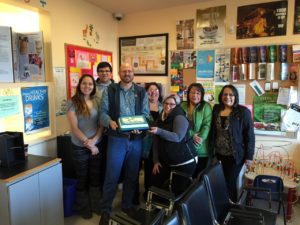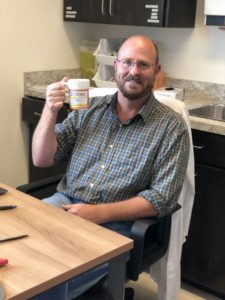Physician has passion for working with underserved communities
Growing up in rural Africa, Dr. Shaun Butcher developed a passion for serving remote communities. The physician moved to Alberta in 2008 and currently serves six Indigenous communities in the northern part of the province, embracing their culture to better serve his patients.
It was a long and winding road that brought Dr. Shaun Butcher to a career in rural Alberta.
Possessing a passion for knowledge and longing to understand humanity, Dr. Butcher knew practising medicine was what he was always meant to do.
“I spent quite a bit of time at university before I actually went into medicine…. I’ve always been interested in humanities and the workings of the human mind,” he shared. “Humans are fascinating. Every time you meet somebody new and start working with them, it’s like starting to read a good book.”

“In Africa, we get conscripted to the military, so when I left [high school] in 1990, I had to do my year,” he explained. “I actually entered into the military with the idea of studying medicine … and then I just got a little sidetracked and decided that I wanted something different. That led me onto the path of teaching and education.”
Dr. Butcher’s life also serves as a good pager turner. He experienced many twists and turns as he figured out what he wanted to do and how he wanted to pursue his passions.
Growing up in Zambia, as well as South Africa, Dr. Butcher obtained numerous degrees throughout his educational career including a Bachelor of Arts degree majoring in English, philosophy, and history, a higher education diploma, and an Honours Bachelor of Education degree with a major in the philosophy of education.
Starting off his career as a teacher, although he enjoyed it something felt as though it was missing, so in he applied to medical school and started practising in 2004.
“Life is a journey,” Dr. Butcher laughed as he reflects on the many paths he’s travelled to get to where he is today. “I took the [road] less travelled and that has made all the difference.”
“I’ve just always had a heart for the underserved and underprivileged.”
-Dr. Shaun Butcher, McLennan area family physician
Today, Dr. Butcher says his approach to being a doctor stems from the experiences he had growing up.
“I grew up rural, and my mother was a nurse in a small rural hospital, [while] my father was in the veterinary department and did a lot of travelling,” Dr. Butcher explained. “I’ve just always had a heart for the underserved and underprivileged.
“I find when that first contact between the medical system and the rural world comes together, it’s such an important juncture,” he said. “Depending on how that meeting goes, it will [influence] the rest of the interactions with that person and their willingness to access health services.”

Dr. Butcher spent four years serving 12 remote communities in South Africa with a mobile clinic. Sadly, the joy he found from his work was overshadowed by political strife and violence throughout his home country, leading to the need for change. After coming to Canada in 2008, Dr. Butcher worked in several Alberta communities.
“Leaving Africa, I [wanted] to get back and keep going with really rural and remote medicine,” he stated, explaining that he worked at clinics in Falher and McLennan before Kee Tas Kee Now Tribal Council (KTC) approached him about working within their communities.
“Initially, I only started with two communities, Utikoomak and Cadotte, and then as that got bigger and people saw that I was going to stay and they grew to trust me, [the tribal council] started offering more communities and more time. So, I expanded [my practice] to take on Loon River, then Little Buffalo…. At this stage, I go in person to six communities doing itinerant clinics.”
“The more you [understand] humanity, the more you realize that medicine is truly an art of understanding the whole person.”
-Dr. Shaun Butcher, a family physician who works with northern Indigenous groups
Having worked in these Indigenous communities for more than 12 years, those who work with Dr. Butcher say that he has been accepted by the people he cares for, not only for the work he does, but also because of how he’s embraced the people and their culture.
“In Indigenous communities, trust is probably the biggest factor in a successful relationship, and he’s been able to develop trust with individuals, families, and communities,” shared Kirsten Sware, who worked with Alberta Health Services to recruit Dr. Butcher, and previously worked with the tribal council.
“It can take a long time [to build trust] because of the culture and sensitivities, [but] he was able to do that really quickly. Now, he’s seeing multi-generational members of the same family because of that trust.”
The physician’s commitment to his patients is obvious when looking at all the additional efforts he has made to be part of the community.
“[Dr. Butcher is] a very committed, caring, intelligent, and friendly doctor,” said Selena Willier-Schmidt, assistant health director for the Kee Tas Kee Tribal Council. “He’s [humble], and he doesn’t mind pounding the pavement to help make things work for our communities.
“He really cares and is willing to do that extra work to help us improve our programming,” she continued, explaining how he’s been involved in everything from women’s wellness clinics to sitting on panels to help strengthen programming for youth.
“He’s always saying ‘I want to learn more. I want to help with this area. I want to be a part of that team.’ These are all things that are above and beyond … He’s always willing to try new things, and I really appreciate that.”
“[Dr. Butcher is] a very committed, caring, intelligent, and friendly doctor. “He’s [humble], and he doesn’t mind pounding the pavement to help make things work for our communities.”
-Selena Willier-Schmidt, assistant health director
for the Kee Tas Kee Tribal Council
For Dr. Butcher, this willingness to help comes back to his desire to understand his patients at a holistic level. To him, embracing cultural practices is just as important as accessing additional medical training, with both representing a desire to learn and willingness to be open. That, he believes, is the key to being a good doctor.
“The more you [understand] humanity, the more you realize that medicine is truly an art of understanding the whole person,” said Dr. Butcher, explaining that he’s currently studying epigenetics, the study of how behaviours and environment affect our genes.
Many conditions and diseases are related to genes in some way.
“I often say to some of my patients, ‘it’s like painting a picture,’” he continued. “‘You need to be able to use all the colours and as many techniques as you can to really illustrate what you’re seeing before you. If you’re going to cut certain colours or certain techniques, you’re not going to be able to get the [best] picture possible.
“‘You need to be open to be able to incorporate all realms into the view of the patient, as well as dealing with their health and their humanity.’”
